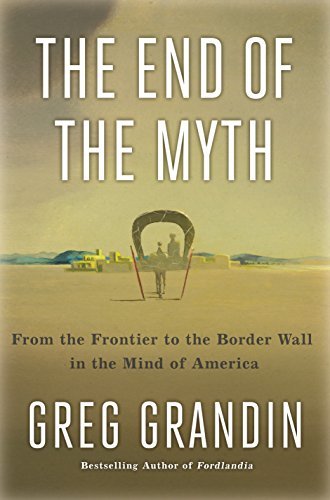What do you think?
Rate this book


375 pages, Kindle Edition
First published March 5, 2019
The frontier, here and henceforth, was a state of of mind, a cultural zone, a sociological term of comparison, a type of society, and adjective, a noun, a national myth, a disciplining mechanism, an abstraction, and an aspiration. (p.116)However, this book's narrative builds to the conclusion that the latest Trumpian calls for a border wall indicates that the myth has reached its end—the American myth has finally arrived at the ultimate closed border. What this means is that the nation can no longer avoid coming to terms with issues of inequality and domination at home—problems that in the past were glossed over by redirecting attention to the myth of the frontier.
“Expansion would break up society “into a greater variety of interests and pursuits of passions, which check each other.” The amalgamation of power would be prevented, making it unnecessary to take government action, either to regulate concentrated wealth or to repress movements organized in opposition to concentrated wealth. “Extend the sphere,” Madison wrote, “and you take in a greater variety of parties and interests,” and you make it difficult for either a mob majority or a tyrannical minority to unite “to invade the rights of other citizens.” (p.29)This book was a finalist for the 2020 Pulitzer Prize.
... ... ...
Whatever one's take on any of the debates of the day (especially the debate over slavery), and whatever one's philosophical understanding of the relationship of republicanism to land, commerce, finance, and labor, most agreed on practicalities. Also wanted to remove Spain from the Mississippi; also wanted the capacities to pacify hostile native Americans and put down rebellions of poor people; and all wanted Great Britain to get out of the way of their commerce. All wanted “room enough,” as Thomas Jefferson would put it in his 1800 inaugural address, to be protected from Europe’s “exterminating havoc.”
Expansion became the answer to every question, the solution to all problems, especially those two caused by expansion.” (p.29-30)
... ... ...
“Many historians still consider Jackson’s two terms (1829–1837) the fulfillment of the promise of the American Revolution’s anti-aristocratic aspirations, a moment of boisterous egalitarianism in which restless white workers armed with the vote became a political force. (p.56)
... ... ...
“The war in the Philippines gave English a successor word to “frontier,” used to refer to remoteness: “boondocks,” from the Tagalog, “a distant, unpopulated place,” adopted by U.S. soldiers fighting a shadowy war against hit-and-run enemies. Its usage was expanded in World War II and then shortened in Vietnam to “boonies.” (p.126)
... ... ...
“Maybe after Trump is gone, what is understood as the political “center” can be reestablished. But it seems doubtful. Politics appears to be moving in two opposite directions. One way, nativism beckons; Donald Trump, for now, is its standard-bearer. The other way, socialism calls to younger voters who, burdened by debt and confronting a bleak labor market, are embracing social rights in numbers never before seen. Coming generations will face a stark choice—a choice long deferred by the emotive power of frontier universalism but set forth in vivid relief by recent events: the choice between barbarism and socialism, or at least social democracy.” (p.275)


only the United States has had a frontier, or at least a frontier that has served as a proxy for liberation, synonymous with the possibilities and promises of modern life itself and held out as a model for the rest of the world to emulate.If I could, one of my quibbles with the book is its self-limitation in not examining, even if briefly, places where that American advertisement was purchased and reproduced - albeit in a different key. Here I am thinking of Western Canada and the much different history that Alaska carries (which does not come up much here).